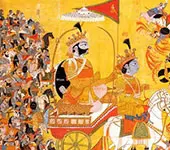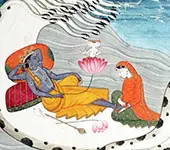Once upon a time, there was a king named Sundarvardhan in Karunapuri. He was a skilled and wise ruler but did not believe in God. One day, disguised as a common man, he set out with his ministers to observe his people. Along the way, he came across two beggars.
The first beggar was pleading, ‘Please give me something in the name of God.’ The second beggar, in contrast, was saying, ‘Please give me something in the name of the king.’
Curious about their different approaches, the king summoned both beggars to his court the next day. He asked, ‘Why do you beg in these different ways—one invoking God’s name and the other mine?’
The first beggar replied, ‘The entire world exists by God’s grace. He is the giver of all wealth, so I take His name when begging.’
The second beggar said, ‘I have never seen God, but the king is visible and provides wealth to people. That’s why I take the king’s name while begging.’
The king dismissed them but later remarked to his minister, ‘The one who begs in my name is wiser.’ The minister disagreed, saying, ‘O King! Without God’s grace, even the help you provide cannot reach anyone.’
The king decided to test whose grace was greater—his or God’s. He issued a proclamation throughout the kingdom: ‘On the upcoming Ram Navami, the king will reward everyone who visits his palace.’
On Ram Navami, a large crowd gathered at the palace to receive gifts. Among them were the two beggars. The king gave the beggar who invoked his name a large pumpkin, saying, ‘This will make you wealthy.’
A few days later, while traveling through the kingdom, the king and his minister saw the same beggar still begging. Surprised, the king asked, ‘Why are you begging even after receiving the pumpkin?’
The beggar replied, ‘O King! I sold the pumpkin for two silver coins and used the money for food. That’s why I am begging again.’
The king said, ‘Fool! That pumpkin was filled with gold coins. If you had cut it open, you would have become rich.’
Moving further, the king and his minister met the other beggar, the one who begged in God’s name. He was now enjoying a prosperous life. The king called him and asked, ‘How did you become so wealthy in such a short time?’
The beggar replied, ‘O King! It is all due to God’s grace. When my father passed away, I had to feed people as part of a ritual. I bought a pumpkin from another beggar for this purpose. When I cut it open, I found it filled with gold coins.’
The king realized that everything in this world is ultimately governed by God’s grace. Humbly, he bowed his head before the divine power.
Thus, the king learned a valuable lesson: Wealth and success ultimately flow from God’s blessings.
Comments
Read more comments
Knowledge Bank
Rashi Purusha
Ayurveda considers man to be a composite of three types of factors - physical, mental, and spiritual. This is what Rashi Purusha means. These factors are distinct from each other but interrelated. Man simultaneously lives in the physical world. psychological world, and spiritual world.
What is the meaning of Bhagavata?
Anything that belongs to Bhagavan or Bhagavati is called Bhagavata. Anything that is connected to Bhagavan of Bhagavati is also Bhagavata. The bhakta is also called Bhagavata. भगवतो भगवत्या वा इदम्। तयोः संबन्धिनि च। भक्तः।
Recommended for you
Krishna's Name Is The Most Effective Medicine In The World

Discover why King Yayati said that Krishna's Name Is the most effective medicine In the world....
Click here to know more..Sanjaya Consoles Dhritarashtra

This discourse which is part of Mahabharata series describes how Sanjaya consoled Dhritarashtra when he was lamenting about the death of his sons.....
Click here to know more..Parashurama Stotram

karaabhyaam parashum chaapam dadhaanam renukaatmajam. jaamadagnyam bhaje raamam bhaargavam kshatriyaantakam.....
Click here to know more..